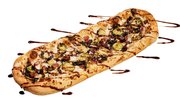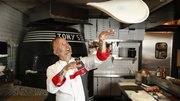Article
Why Aloha Poke sticks with a simple biz model
Operating a restaurant is obviously complicated, but Aloha Poke CEO Chris Birkinshaw has found that keeping things simple is the way to go.

December 3, 2019
Operating a restaurant is obviously complicated, but Aloha Poke Co. CEO Chris Birkinshaw has found that keeping things simple is the way to go. In fact, he's built his operations strategy around what he calls a "simple infrastructure."
"There is a less complex operation due to the menu, operating procedures and store design," he said in an interview with FastCasual. "We use a single cloud-based system for back-office management, covering scheduling, inventory, invoice capture, AP, financials, etc. The overhead component is a much lighter lift than the usual fast casual franchise."
The 18-unit brand, which started out as a tiny location in a Chicago train station, has a flexible footprint requiring as little as 250 to 1,200 square feet. That's because it doesn't require custom coolers, inserts, holding tables, etc. Nor does it need grills, fryers or ventilation, which allows it to serve customers quickly in a simple, clean and trendy environment. And it's pay-first model allows the team to work from a ticket printer similar to chefs in full-service kitchens.
"We use a flexible, modular-equipment package vs custom-made pieces, which in return ends up saving Aloha Poke corporate and franchisees a ton of money," Birkinshaw said.
Another bonus of needing little space is that Aloha has better access to prime real estate.
"There are a ton of fast casual restaurants all chasing the same 2,000 square-foot box, creating a lot of competition for real estate and driving up real estate costs," Birkinshaw said. "Since our equipment needs aren't the same, and we don't use a Chipotle-style 30-foot line with a sneeze guard, we can be much more nimble when great real estate is presented that may be a little too small for the traditional fast casual chains."
He may be onto something, considering the AUV for his 18 locations is $800,000, and the cost of opening a unit ranges from $138,800 to $357,700.
"Cross-referenced against our actual P&L financial model in Item 19, the cash-on-cash returns and initial payback model is exceptional," he said.
The growth plan
Although Aloha doesn't yet have any franchisees, that's coming soon as Birkinshaw is on the hunt for his first franchise partner.
"The same financial model that appeals to franchisees, appeals to us, too," said Birkinshaw, who plans to open more units in the Central and Eastern time zones to keep support close and gain efficiencies with supply chain.
"Though, we are open to consider most anywhere in the US," said the industry vet, who started his career at Starbucks and then held a variety of senior management positions at Potbelly, "at this time, we are not looking internationally. I've done this in a past life, and while international growth is super exciting, it is critical to success to tailor a concept to the needs and culture of a new country, and it can be expensive, a distraction, and few are successful with this initially."
The success is in the journey
Birkinshaw, who believes success lays in the journey, said his goal is to provide people with healthy, customizable, convenient alternatives to burgers, tacos, fried chicken and pizza.
"We've got food that makes you feel good after you eat it," he said. "We hear from customers that we've improved their lives, and it doesn't get any better than that to me. And we are committed to seafood sustainability and must grow responsibly. If we do these things well, one customer, one shop, one market at a time, the sky is the limit."
 ChatGPT
ChatGPT Grok
Grok Perplexity
Perplexity Claude
Claude












